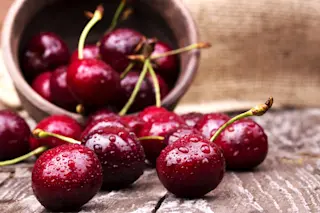We know that unhealthy foods (fried, fatty, simple carbs) and drinks (soda, sugary drinks) are not good for us, but would you ever give a second thought to the healthy foods you consume? Surprisingly, some extremely nutritious foods have a hidden danger of toxicity. Although these foods can have potentially harmful effects, there’s no need to give up any of them. Just avoid the circumstances that can pose a health hazard, and enjoy!
Cherries
Not only are cherries delicious, they’re loaded with health benefits — thanks to their potassium, Vitamin C, and fiber. Rich in antioxidants and inflammatory reducing compounds, cherries also hold the potential to improve heart heath, arthritis, gout, and sleep quality. However, this superfood member of the stone fruit family has one potential pitfall: Inside the pit (called the stone) of these fruits, there are seeds, which are not meant to be eaten. These seeds contain amygdalin, which the body converts into cyanide. This doesn’t mean that if you accidentally swallow a whole cherry pit, you need to panic. It’s only when the pit is crushed that the amygdalin is released. Just don’t grind up a bunch a cherries with pits into your smoothie and you should be fine.
Brazil Nuts
Selenium is important for thyroid function, fighting damage from free radicals, and reproduction. This important nutrient can be found in a variety of foods, including salmon, chicken, eggs, and enriched bread. However, no food can match the Brazil nut for the punch of selenium it packs. Just a few Brazil nuts can provide up to 200 mcg of selenium and many other nutrients. While 400 mcg is considered the upper limit of tolerable amounts, most people only need a much smaller daily amount. Higher amounts are dangerous and lead to toxic effects. At extremely high levels, symptoms can include heart attack, kidney failure, respiratory issues, and tremors. Experts suggest limiting your consumption of Brazil nuts to one to three per day.
Potatoes
The potato is a simple, yet versatile food. This humble vegetable has a frequent place in many people’s diets. Naturally gluten free, the health benefits of potatoes are impressive: Their fiber helps keep down cholesterol and blood sugar. This modest powerhouse vegetable contains antioxidants, prebiotics, and substantial amounts of B6, potassium, magnesium. Bonus points for eating the skin! Just avoid potatoes with any green coloring. The green is actually harmless chlorophyll — the presence of which indicates a toxin called solanine. In high doses, solanine can cause can cause headaches, gastrointestinal symptoms, lower body temperature, and slow pulse. In extreme cases, solanine poisoning has led to paralysis of the central nervous system, convulsions, and death.
Red Kidney Beans
Beans are a staple in many vegetarian and vegan diets, and it’s easy to see why. Red kidney beans are among the healthiest, with one cup containing over 25% of the daily recommended amount of protein and almost half of the daily fiber recommendation for women. Add in the iron, magnesium, and folate and you have an incredible meatless food that can help regulate blood sugar, aid weight loss, and reduce cancer risk.
Just be sure not to eat them undercooked. Several types of dried beans contain the toxin phytohemagglutinin, but red kidneys contain the most. Side effects if eaten undercooked (or raw, which apparently has been done) include abdominal pain, vomiting, diarrhea, and nausea. Luckily, there’s a simple way to avoid this: Rapidly boil the beans to at least 176 degrees. Slow cookers usually don’t get the beans hot enough to destroy the toxin, so boil them first before putting them into the slow cooker. And to make life even easier, you can used canned beans — they’ve already been processed at a high temperature.
Water
While technically not a food, water is something we’re constantly advised to consume enough of daily. The Mayo Clinic advisees 11.5 cups for women and 15.5 cups a day for men. Being hydrated helps protect our organs and tissues, lubricates joints, carries nutrients to our cells, and helps flush out waste products in the kidneys and liver. But there’s actually too much of a good thing. When people process excessive amounts of water, electrolytes are negatively impacted and sodium levels are reduced. Lack of sodium can lead to fluids getting into cells and causing swelling, resulting in water poisoning. When this happens, the result can be brain pressure, high blood pressure, and low heart rate. Symptoms include clear urine, nausea/vomiting, fatigue, muscle cramps, and headaches.















